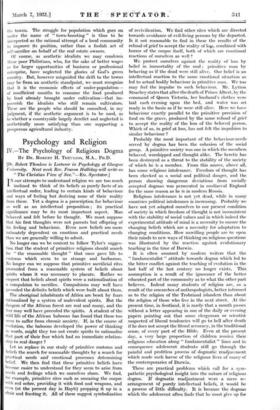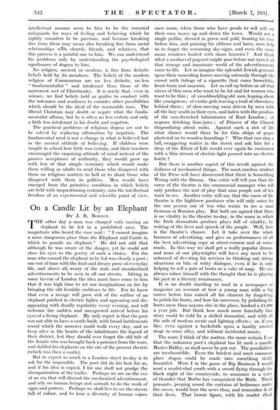• Psychology and Religion
W.—The Psychology of Religious Dogma
BY DR. ROBERT H. TIMULESS, M.A., PH.D.
[Dr. Robert Thouless is Lecturer in Psychology at Glasgow University. Next week Rev. Fearon Halliday will write on " The Christian View of Sex."—ED. Spectator.] Iour attempts to understand religion we are too much inclined to think of its beliefs as purely facts- of art intellectual order; leading to certain kinds of behaviour and ways of -feeling but deriving none of their reality from these. Yet' a dogma is a prescription for behaviour as well as an intellectual proposition ; its practical significance - may be its most 'important aspect. Man behaved and felt before he thought. We must suppose that his first thoughts were not parents -but offspring of his feeling and behaviour. Even now beliefs are more intimately dependent 'on emotions and practical needs than we are generally willing to admit.
No longer cnn we be content to follow Tylor's sugges- tion that the student of primitive religions should search for " the reasonable thought " that once gave life to customs which seem to us strange and barbarous. No longer can we suppose that primitive sacrificial rites proceeded from a reasonable system of beliefs about spirits- whom it was necessary 'to placate. Rather we suspect that beliefs about spirits were a rationalisation Of a compulsion to sacrifice. Compulsions may well have preceded the definite beliefs which were built about them. The aboriginal inhabitants 'of Africa are beset by fears rationalised by a system, of malevolent spirits. But the dangers of the African forest are real and many, and the fear may well have preceded the spirits. A student of the wild life of the African baboons has found that these too seem to suffer from chronic anxiety. -If, in the course of evolution, the baboons developed the power Of thinking in words, might they too not create 'spirits to rationalise that part of their fear which had no immediate relation- ship to real danger ?
Let us replace in our study of primitive customs and beliefs the search for reasonable-thoughts by a search for Practical needs ' and" emotional processes determining belief. We then find -that these primitive beliefs have become easier to understand for they seem to arise from needs and feelings which we ourselVes share. We find, for example, primitive rites such as smearing the corpse with red ochre,' prOViding it with food and weapons, and even (at the present day in Hayti) propping it up in a chair and feasting it. All of these suggest symbolization of revivification. We find other- rites -which are directed towards avoidance of evil-living persons by the departed. Is it not reasonable to find in these the results of the refusal of grief to accept the reality of lop, combined with , horror of the corpse itself, both of which are emotional reactions of ourselves as well ?
We protect ourselves against the reality of loss by belief in immortality of the soul ; primitive man by behaving as if the dead were still alive. Our belief is an intellectual reaction to the- same emotional situation as led to actual bodily behaviour in primitive man. We too may feel the impulse to such behaviour. Mr. Lytton Strachey states that after the death of Prince Albert, by the command of Queen Victoria, her husband's clothes were laid each evening upon the bed, and water was set ready in the basin as if he were still alive. Here we have behaviour exactly parallel to the primitive provision of food on the grave, produced by the same refusal of grief to accept the reality of the loss of the beloved person. Which of us, in grief at loss, has not felt the impulsion to similar behaviour ?
Probably the most important of the behaviour-needs served by dogma has been the cohesion of the social group. A primitive society was one in which the members behaved, worshipped and thought alike. The heretic has been destroyed as a threat to the stability of the society of which he is a member. From this source, above all, has come religious intolerance. Freedom of thought has been checked as a social and political danger, and the person showing dangerous deviations from socially accepted dogmas was persecuted in mediaeval England for the same reason as he is in modern Russia.
Religious intolerance is not yet dead, while in many countries political intolerance is increasing. Probably we have not yet adapted ourselves to our present condition of society in which freedom of thought is not inconsistent with the stability of social values and in which indeed the experimental attitude of mind is a necessity to ensure the changing beliefs which are a necessity for adaptation to changing conditions. How unwilling people are to open their minds to new ways of thinking on religious questions was illustrated by the reaction against evolutionary teaching in the time of Darwin.
It is often assumed by modern writers that the " fundamentalist " attitude towards dogma which led to .the bitter conflict against the teaching of evolution in the last half of the last century no longer exists. This assumption' is a result of the ignorance of the better educated part of the community as to what the other part believes. Indeed many students of religion are,, as a result of the researches of anthropologists,,better informed as to the religion of the Trobriand islanders than about the, religion of those who live in the next street. At the present time, in Scotland, it is rarely that a month passes without a letter appearing in one of the daily or evening papers pointing out that some clergyman or scientist suspected of liberal tendencies will go to hell after death if he does not accept the literal accuracy, in the traditional sense, of every part of the Bible. Even at the present day, a very large proportion of children receive their religious education along " fundamentalist " lines and in consequence -adolescent students still go through the painful and profitless process of dogmatic readjustment which made such havoc of the religious lives of many of the contemporaries of Darwin.
'These are practical problenis which call for a sym- pathetic psyehological insight into the nature of religious dogma. If dogmatic readjustment were a mere re- arrangement of purely intellectual beliefs, it would be a process of little difficulty. It is because the dogmas which the adolescent often finds that he must give up f6r intellectual reasons seem to him to be the essential safeguards for ways of feeling and behaving which he rightly considers to be precious, and because breaking free from them may mean also breaking free from social relationships wfth church, friends, and relatives, that this process is a painful one to him. We can understand his problems only by understanding the psychological significance of dogma to him.
No religion, ancient or modern, is free from definite beliefs held by its members. The beliefs of the modern religion of Communism arc no less definite, no less " fundamentalist" and intolerant than those of the narrowest sect of Christianity. It is rarely that, even in science, we find beliefs held as guides to conduct with the tolerance and readiness to consider other possibilities which should be the ideal of the reasonable man. The . liberal Christian may doubt or negate what the funda- mentalist affirms, but he is often no less certain and only a little less intolerant in his doubt and negation.
The practical problems of religious dogma arc not to be solved by replacing affirmation by negation. The . fundamental need is not a change in what is believed but in the mental attitude of believing. If children were taught in school how little was certain, and their teachers encouraged the enquiring attitude of mind instead of the passive acceptance of authority, they would grow up with less of that simple certainty which would make them willing as adults to send those who disagreed with them on religious matters to hell or to shoot those who disagreed with them in politics. Men would have emerged from the primitive condition in which beliefs are held with unquestioning certainty, into the intellectual freedom of an experimental and scientific point of view.



























































 Previous page
Previous page